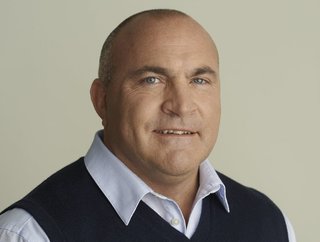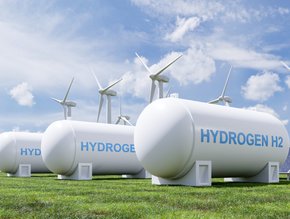Is digital engineering a solution to the energy trilemma?

Headquartered in Pennsylvania, Ansys supports companies and industries in accelerating their digital transformations using simulation. The company acknowledges the individual,unique, constantly evolving challenges that different industries face, and delivers the expertise, capabilities and tools to transform the design and production processes.
Scott Parent is Vice President of Field Technology for the Office of the CTO at Ansys, a role he's held since 2022. At Ansys he leads energy and industry-specific simulations solutions and methodologies which support the energy transition across aerospace, energy and industrial.
Parent holds a bachelor’s degree in mechanical engineering and a master’s degree in aerospace engineering and has previously held roles at companies such as BP, Baker Hughes and GE Power.
He shares expert insight on the energy trilemma, looking at how modern technological solutions — such as the extensive use of engineering simulation — could be the key to solving it and providing energy that is not only sustainable, but reliable, robust, and available to everyone globally.
What is the trilemma facing the energy industry?
As businesses, organisations, and governments all over the world put more and more effort into decarbonising the economy, the energy industry faces a trilemma, which can be broken down into three main pillars. Firstly, it needs secure, affordable, and scalable energy to serve a growing population. Secondly, that energy must be delivered, converted, and consumed more efficiently. And thirdly, there is a need for new, cleaner energy sources to support growth, whilst replacing the widespread use of fossil fuels.
Do you think the current conversation around decarbonisation takes into account all three pillars of the trilemma?
The conversation surrounding decarbonisation can often be too narrow, which risks neglecting the wider trilemma. Conversations can be dominated around potential solutions like, ‘banning all fossil fuels’ which doesn’t take into account how complicated of an issue this is. If we are to succeed in providing robust, reliable, and affordable energy to everyone on the planet, each pillar of the trilemma needs to be addressed.
For example, if we look at the first issue, there is the need to significantly increase the number of people who have access to electricity. Although an additional one billion people have been given access to electricity in the past few decades, there are still around one billion people worldwide who do not have access to electricity. Additionally, there is the issue of efficiency – currently, around 65% of the energy that is sourced, converted, and consumed worldwide is wasted through inefficiencies.
So, before we even look at the third pillar of the trilemma – developing a new, cleaner energy source – there are significant things that can be done to improve the situation in the short term and increase the energy we currently supply, through a big improvement in efficiency.
In this endeavour, digital engineering is making great strides forward. The application of digital technologies to engineering, design, simulation, optimisation, and the operation of systems and processes across the whole life cycle of a product is making a significant contribution to energy efficiency and sustainability – and its contribution will only increase over time.
What can be done in the short term if we are to achieve our net-zero goals?
In the short term, whilst we are in a transitional period where new technologies and energy sources are being discovered and developed, improving energy efficiency in all products and processes is the best way to reduce our greenhouse gas emissions. If efforts are focused on this area, it could reduce overall greenhouse gas emissions by up to 40%, which would go a long way to helping us achieve our short-term net-zero ambitions. Currently, 31% of the world’s greenhouse gas emissions footprint comes from converting fossil fuels into electricity and heat; of that electricity, a massive 45% is used in electrical motors in isolation. This means that currently, 15% of all greenhouse gas emissions produced by humans come from electric motors. This is particularly significant as the global transportation sector is currently embarking on a vast electrification effort, meaning that the use of electric motors is set to exponentially increase in the coming decades. As a result, any efficiency that can be improved in electric motors could reduce global emissions by a few percent. Although that may sound small, this would be a huge win for the planet, as this solution is made up of many smaller percentage reductions in the aggregate.
How can digital engineering be employed in the design process to improve sustainability?
It is crucial to consider sustainability right from the off in the design process. This is because the majority of a product’s cost and environmental impact are locked in during the development and design cycle. One such decision that is critical to the overall impact that any product may have is that of materials selection. The materials that are used determine weight, and therefore overall efficiency, but also the recyclability. This is where the extensive use of digital engineering is pivotal. Firms are able to use digital engineering to input the exact properties of countless materials to be used in their simulations that are done at the beginning of the lifecycle. This means they get full insight into the most energy-efficient and cost-effective materials to use. Once the materials are chosen, further simulations can be done to determine the optimal shape and makeup of a product, again reducing material usage, but critically without reducing strength. All of this works together to make a product that is more efficient in the first instance but also goes a long way to improving the overall life cycle of the product, including having less material to recycle at the end of the lifecycle, thus reducing energy consumption even further.
How can digital engineering be employed as the energy industry transitions to a more digital future?
On our path to a more sustainable future, there are many new technologies that will be employed. The evolution of technologies such as the Internet of Things and 5G communications are driving the digital transformation of the industry as a whole and will play a crucial role moving forward. However, the challenge comes with regards to energy assets and infrastructure that were commissioned long ago, well before the explosion of the digital age. A big component of shifting the entire industry forward will be installing sensors, actuators, and communication devices so they can all be incorporated into the Internet of Things, and this again is where the extensive use of digital engineering will be critical. It will allow a digital thread to be created that links all assets, old and new, into a single system that can be monitored by digital twins. Digital twins are a virtual replica of a real-world asset that allows engineers to understand how that asset will work in any given scenario. The use of digital twins allows teams to optimise efficiency, reliability, durability, and real-time performance – all absolutely crucial to ensuring the long-term sustainability of any given product.
*********************************************
For more energy insights check out the latest edition of Energy Digital Magazine and be sure to follow us on LinkedIn & Twitter.
You may also be interested in Sustainability Magazine and EV Magazine.
************************************************
Sustainability LIVE Net Zero will be hosted live from the QEII Centre, London on the 6th and 7th of March, and streamed globally via our virtual event platform Brella. Sustainability LIVE Net Zero will delve deeper into the strategies, innovations, and collaborative efforts propelling us toward a net-zero future. The conference and exhibition gives the opportunity to connect with like-minded peers and actively contribute to crafting a sustainable future.
Following Sustainability LIVE Net Zero, viewers can also sign up for Sustainability LIVE Dubai, Singapore and New York.
Sign up to the The Global Sustainability & ESG Awards 2024, coming to London on the 10th September 2024.
************************************************
BizClik is a global provider of B2B digital media platforms that cover Executive Communities for CEOs, CFOs, CMOs, Sustainability Leaders, Procurement & Supply Chain Leaders, Technology & AI Leaders, Cyber Leaders, FinTech & InsurTech Leaders as well as covering industries such as Manufacturing, Mining, Energy, EV, Construction, Healthcare + Food & Drink.
BizClik – based in London, Dubai, and New York – offers services such as Content Creation, Advertising & Sponsorship Solutions, Webinars & Events.






